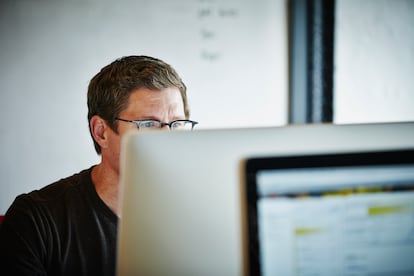A selling point collapses: Blue light-blocking glasses don’t work
A scientific review of 17 studies concludes that these accessories have no effect on eye fatigue or sleep quality

Blue light filters might make sense from an advertising point of view, but not from a scientific or health perspective. While the glasses that include this added benefit are more expensive, they have not been able to prove anything: they do not prevent eye fatigue caused by the use of smartphones and computers, nor do they improve the quality of sleep.
A review of 17 trials has confirmed this notion, which the scientific community has been claiming for years. This compilation of the best scientific evidence available to date leaves no room for doubt: “The use of blue light-filtering glasses to reduce the eye strain associated with computer use may not have short-term benefits. It is also not clear whether these glasses affect the quality of vision or sleep,” explains Laura Downie, professor of optometry at the University of Melbourne and author of the scientific review. Downie believes that people should “take these findings into account when deciding whether to buy these glasses.”
In recent years, with the rise of mobile devices, blue light filters have become popular. According to an Australian study, 75% of eye doctors prescribed this type of lens in 2018. They may come in the form of a perk one can acquire when purchasing a pair of prescription glasses, or as a separate, specific model that only serve to filter blue light. In addition, many mobile devices include a night shift mode that makes the colors of the screen warmer in order to limit the blue light they emit. All of this, however, is useless, as there is no science to back it up.
Advertisements claim that this technology filters certain light waves emitted by digital devices such as phones, computers and tablets, which boost attention and wakefulness, manipulating the biological clock. Therefore — in theory — if one is exposed to the blue light of a smartphone before going to bed, falling asleep will be more difficult. There is some scientific basis for this statement: several studies carried out on fruit flies show that they do alter their sleep pattern after being exposed to blue light. “The problem is that our neural circuits are much more complex than those of a fly,” says Conchi Lillo, a researcher of eye diseases from the University of Salamanca in Spain and author of the book ¡Abre los ojos! (Open your eyes!).
It is the companies that sell blue light filters that warn about its effects; that is the problem”Conchi Lillo, eye disease researcher at the University of Salamanca i
The amount of blue light our eyes receive from artificial sources like computer screens is about one thousandth of what we receive from natural light. Thus, its effects should be negligible. In addition, filter lenses only block between 10% and 25% of the blue light, depending on the product. What’s more: Lillo warns that these filters can actually be counterproductive. “During the day, we need to receive the blue light of the sun to regulate our circadian cycle. If we block it, we can experience drowsiness and sleep disorders.”
The review also found no evidence that blue light filtering lenses protect against damage to the retina, the light-sensitive tissue at the back of the eye. “It has not been possible to draw conclusions regarding the possible effects on the health of the retina in the long term,” confirms Dr. Downie. Nor has any relationship between blue light and eye fatigue been established, even if there have been ads warning about it for years.
In this case, another falsehood has been established over a true fact: eye fatigue does occur when we spend a long time in front of a screen, “but not because of the blue light,” Lillo strongly emphasizes. “When you are in front of the computer, you blink less, which causes dryness, and you focus your eyes on a specific, very close point. This can be solved by resting your eyes for 20 seconds every 20 minutes,” she points out. In certain contexts, the cold, bright blue light can be unpleasant for some people, but this, explains Lillo, is easy to fix: “Just lower the intensity.”
Andrew Przybylski, from the University of Oxford, is blunt: “I thought the claims were unreliable, but this assessment is rather unfavorable,” he says. “It gives the public a chance to pause and ask themselves if they really should change their behavior or buy things to address what they fear to be digital age issues. It would be good if people applied the same suspicion they have towards technology to research that confirms their fears and to those who sell quick solutions.”
This review entails a scientific endorsement to the movement that in recent years has alerted against the use of fear as a commercial strategy. The Spanish Society of Ophthalmology positioned itself against blue light blockers in 2017. In the United Kingdom, things have gone further: that same year, Boots Opticians was fined £40,000 ($56,000) after making “misleading and unsubstantiated” claims on the topic.
“It is the companies that sell blue light filters that warn about its effects,” denounces Lillo, “that is the problem.” First of all, she believes, they do it because they clearly profit from it. “But there are also some who do it in good faith, because they are not well-informed, because there is a lot of misinformation on this subject.”
Sign up for our weekly newsletter to get more English-language news coverage from EL PAÍS USA Edition
Tu suscripción se está usando en otro dispositivo
¿Quieres añadir otro usuario a tu suscripción?
Si continúas leyendo en este dispositivo, no se podrá leer en el otro.
FlechaTu suscripción se está usando en otro dispositivo y solo puedes acceder a EL PAÍS desde un dispositivo a la vez.
Si quieres compartir tu cuenta, cambia tu suscripción a la modalidad Premium, así podrás añadir otro usuario. Cada uno accederá con su propia cuenta de email, lo que os permitirá personalizar vuestra experiencia en EL PAÍS.
¿Tienes una suscripción de empresa? Accede aquí para contratar más cuentas.
En el caso de no saber quién está usando tu cuenta, te recomendamos cambiar tu contraseña aquí.
Si decides continuar compartiendo tu cuenta, este mensaje se mostrará en tu dispositivo y en el de la otra persona que está usando tu cuenta de forma indefinida, afectando a tu experiencia de lectura. Puedes consultar aquí los términos y condiciones de la suscripción digital.









































